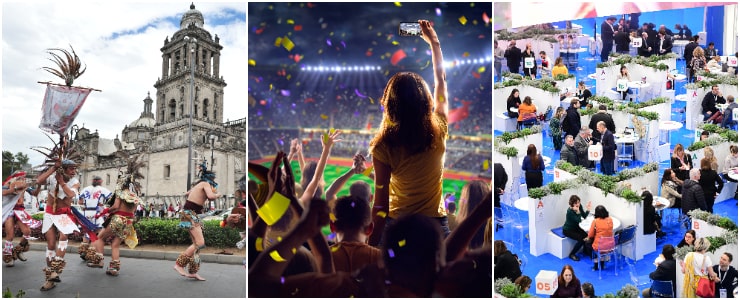The tourism world is dynamic and has evolved in many ways, and one of the many changes is the increase in event tourism, now more than ever. Travelers from all age groups are choosing to attend or participate in events to enhance their travel experiences. From sporting events to music festivals, and conference meetings to outstation weddings, tourism events have become an integral part of the industry.
Event tourism provides travelers with unique and memorable experiences and brings significant economic and social benefits to the host destination. Event tourism can generate revenue for residents, create new job opportunities and promote the local culture and tradition of the destination.
It’s time to explore event tourism in more detail. We will talk about the benefits of event tourism for both travelers and destinations, the different types of events that fall under the umbrella of event tourism, and the challenges and opportunities involved in planning and hosting successful events. Whether you’re a traveler looking for a new adventure or a destination seeking to boost your tourism industry, this article will provide valuable insights into the exciting world of event tourism.
This valuable and drastically growing segment in tourism is beneficial for both event organizers as well as tourists.
Types of Tourism Events

Types of events in tourism may widely fall into different categories and experiences.
1. Cultural or Festival Event Tourism Fair
These events include celebrations, exhibitions, and festivals that showcase the culture and traditions of the host destination.
2. Sports Event Tourism
Sports Tourism exhibition is one of the fastest-growing tourism in the travel industry. It has been observed that more and more travelers are interested in sports activities or events during their trips. This may or may not be the main objective of travel. Sports events are of different types and varieties and attract participants and spectators—Mega Sports events such as the Olympics, World Cup, NBA, IPL, and many others. Smaller events like marathons, relay races, run for charity and other events also come under this category. Such Tourism also calls for infrastructure development and other economic benefits.
3. Business Events
Business Events tourism, popularly known as MICE( Meetings, Incentives, Conferences, Exhibitions), is a more limited and focused subset of regular tourism. People are still at their job and are getting paid but are doing so away from their workplaces. Such events are good for networking, marketing, and education. Business event tourism, in comparison to conventional tourism, involves a smaller segment of the population, with distinct objectives and extra freedom-of-choice-limiting limitations imposed by the commercial components. Business tourist destinations are far more likely to be locations that have been heavily developed for corporate purposes (cities, industrial regions, etc.). A typical business tourist is wealthier than a typical leisure visitor and are anticipated to spend more money.
4. Music and Entertainment Events
Music and Entertainment Event Tourism is the fastest-growing travel trend observed in the new generation. We can see people traveling miles and miles to watch their favorite performers perform live on the stage. Music Tourism is a subset of the vaster category of tourism called cultural and festival tourism, which encompasses travel to observe the festival focusing on the theme of food, beverage, movie, and literature. These festivals include concerts, theater festivals, comedy shows, and other entertainment events.
5. Spiritual and Religious Tourism
These events include pilgrimage, religious festivals and other spiritual gatherings organized around people’s religious and spiritual beliefs. Hajj and Umrah are the biggest examples of religious tourism.
6. Travel Trade Shows
Travel trade shows are where suppliers get to meet their buyers on an individual basis. Destinations, accommodations, and attractions are suppliers; travel trade is buyers. Such events are 2 – 3 days long and are most often made up of short appointments with suppliers. These trade shows are also popularly known as travel exhibitions.
Here are some valuable insights into the exciting world of Tourism Events

Economic Benefits
Event tourism can have a significant impact on the economy. It helps generate revenue for businesses such as hotels, restaurants, transportation services, and local vendors. Additionally, events can create job opportunities for residents.
Social Benefits
Events and festival tourism have the potential to bring people together under one shade. Events can be an excellent opportunity for cultural exchange and social intervention. Events can also promote community development, especially in rural areas where tourists can visit during the events to explore the destination’s culture.
Environmental Impact
Everything has advantages and disadvantages; thus, there can be good and bad environmental effects. The positive impact of event tourism can include raising environmental awareness, encouraging sustainable behaviors, and supporting local conservation initiatives. In contrast, the negative impact might have increased waste output, energy consumption, and emissions.
Safety and Security
Safety and security are essential considerations for event tourism, as they can impact the experience of attendees, the reputation of the event, and the safety of the local community.
Marketing and Promotion
Marketing and promotions are essential to event tourism as they are the conversation starters. They help to generate awareness and interest to attract attendees and maximize revenue.
Innovation and Creativity
Incorporating innovation and creativity into event tourism may aid in creating one-of-a-kind and unforgettable experiences that attract tourists to a region. Event planners can create events that stand out and give something unique and intriguing to guests by harnessing technology, sustainable practices, cultural authenticity, and cooperation.
1. When is World Tourism Day celebrated?
World Tourism Day is celebrated on every year on 27 September.
2. What activities can be done on World Tourism Day?
World Tourism Day Activities include can be:
Travel without moving: visit the neighborhoods of migrant populations, tasting and learning about various cultures!
Workshops: Participate in workshops that will help you gain insights into the travel industry.
Travel Literally: Travel to a destination on your bucket list and post a picture on social media.
3. What is event tourism packaging?
There is no physical packaging around a product in tourism packaging. On the other hand, the packaging is the act of putting together the core tourist product with additional services the traveler desires. Then this package is promoted to the target travelers who can easily purchase the curated holiday experience.
4. What are the different types of tourism activities?
Cultural tourism, sports events, business events, travel trade shows, music and entertainment, and spiritual journeys are some of the top tourism activities.
5. What are the features of event tourism?
Economic benefits, social benefits, environmental impact, safety and security, marketing promotions, innovation and creativity are the features of event tourism.


